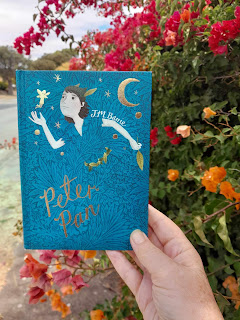Summary: This unusual novel is set in rural Derbyshire in the old manor house, Thackers, where the Babington family and their servant, Cicely Taberner, lived when Elizabeth I was Queen of England. The descendants of the Taberners have farmed the land through the centuries, and to the Taberners of the present day comes Penelope, their great-niece, a sensitive, imaginative girl, who is aware of other layers of time. With her awakened vision she sees people of the past move in their daily tasks among those of the present, and behind the contented life of the household of Cicely and Barnabas Taberner she finds the old tragedy of Anthony Babington and his plot to save Mary, Queen of Scots, being re-enacted.
MY THOUGHTS:
This vintage YA time travel tale was first published in 1939.
The main character is Penelope Taberer Cameron, a lonely, delicate bookworm. She's sent for an extended stay to Thackers Farm, owned by elderly Aunt Tissie and Uncle Barnabas. Penelope's older siblings, Alison and Ian, go along too, but it happens that only Penelope possesses the rare family gift of second sight, which becomes her time travel catalyst.
Time travel, in this story, strikes me as a double exposure sort of phenomenon, similar to old, wind-on film cameras. Every so often a scenario from the past is superimposed over Penelope's routine twentieth century life. She is frequently drawn back to the 1500s, when Thackers was owned by the Babington family, who were closet Catholics and staunch supporters of Mary, Queen of Scots during the time she was imprisoned by her cousin, Elizabeth I.
Young Master Anthony Babington is a red-hot rebel who devotes his life to plans for Mary's release. His younger brother, Francis, becomes Penelope's good friend. Of course, Penelope has the awkward knowledge from her future vantage point that Mary gets executed, but blurting this out earns her no popularity.
Sadly, this book gets the thumbs down from me. It's essentially a history text book written in the guise of a time travel novel to fool the unwary. Different characters tend to launch into lengthy summaries about their life and times for Penelope's benefit (and therefore the reader's). This makes for wooden characterization. And they're all quite chill with the startling way she bobs up every so often in their private chambers, interrupting intimate moments, then disappearing again, supposedly to return to her family in London.
What's more, modern historical fiction authors advise us that there's no need to divulge every snippet we research. Since this is a text book in disguise, Uttley ignores all this and crams in every trivial detail she can possibly manage.
I used to come across this type of book during our homeschooling days, when they were highly recommended. Fellow homeschooling parents seemed to love these incognito history books masquerading as novels. ('The children are learning about the past without even knowing it, hehehe, shh.') I'm sure they knew it alright, like being hit with a brick. It makes for tedious reading, and I'd be willing to bet several kids throughout the decades decided they hated reading novels based on specimens like this.
I don't deny there are a few nice touches. For example, when Anthony Babington loses his precious miniature of Queen Mary which he considers a good luck talisman, Penelope finds it as he asks her to, but in the twentieth century, where it's no good to him. For in this particular time travel universe, inanimate objects are not portable back and forth.
I've noticed several other reviewers have called it, 'a beautiful novel' because of its depth of description, and some of the finer details about agrarian Elizabethan life that comes to light, along with the lovely illustrations by Faith Jaques. My reply would be, 'Sure, it might be beautiful, but it certainly doesn't tick my boxes of what makes a decent novel.'
I love a good novel, and I like a well-written text book, but I have no time for these sneaky hybrids.
🌟🌟




